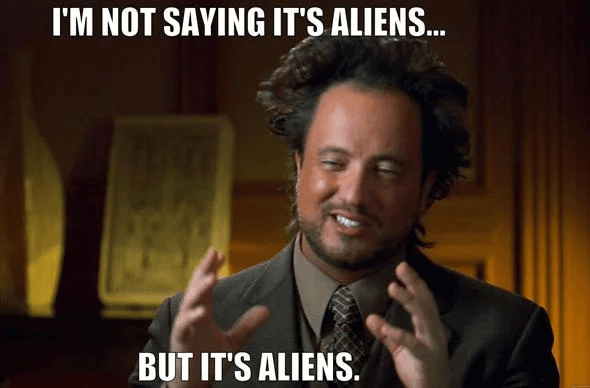There are as many misconceptions about SEO as there are ranking factors. And they can seem just as confusing to figure out. Some of the most common SEO myths are:
- SEO is a one-time event
- Repeating keywords helps rankings
- Direct ranking factors matter most
- Meta keywords are useful
- Other meta tags don’t matter
- The more links the better
- CTR is a direct ranking factor
- PPC benefits SEO
- Social media is a ranking factor
- Bing doesn’t matter
- The higher the word count the better
- The E-A-T Score
- Older domains rank higher
- PageRank is dead
Believing the wrong myths can get us in serious trouble. Lightning never strikes the same place twice. Pee neutralizes jellyfish stings. Pregnant women like complete strangers touching their stomach.
SEO is no different.
Want to avoid getting struck by lightning or having someone pee on your leg for no reason, digitally speaking? Then don’t make the mistake of believing all the SEO myths that come your way.
Why So Many SEO Myths Exist
Because search engines are super shady about how they rank websites.
Google: We rank sites based on 200 factors.
Bing: That’s cute. We use 1,000 factors.
Google: On second thought, we use 10,000 factors. Come at us bro!
Us: Wow, that’s a lot you guys. What are they?
Bing:
Google:
SEO is anything but straightforward. And transparent. But beyond that enlightening conversation, there’s two main reasons why SEO is so often misunderstood.
- It can seem complicated
- It’s constantly changing
As a result, the scientific field of Search Engine Optimization (SEO) is rife with myths and misconceptions.
Why Misconceptions About SEO Are So Dangerous
At best, a misleading SEO myth will keep your pages from ranking as well as they could. At worst, it will destroy your business like a baby pig eating cake.

To ensure a baby pig doesn’t eat your business, we’d like to take some time to debunk the most common SEO myths.
To many, SEO is a mystery. Just like modern art, cats, keeping cactuses alive, and correctly using the word “literally.” They might act like they get it, but they don’t. Not really.
But it doesn’t have to be that way, no matter how new you are to this whole SEO thing.
So consider this the SEO version of 5th grade sex ed. We’re going to share with you the SEO myths and facts of search. Only instead of the awkwardness, shame, and funny feelings, you can leave confident your strategy is on the right track and you’re practicing safe SEO.
SEO Myths You Should Leave Behind
1. SEO Is a One-Time Event
We wish it were that simple. Fact is, SEO is ongoing. It’s a neverending story of tag tweaks, broken link checks, redirects, speed updates, and keyword research. You shower everyday, don’t you? At the very least twice a week. SEO deserves the same attention. Because fresh content ranks best.
Your website should always be considered a “work-in-progress.” With the constant search engine updates, technology changes, and online competition, businesses can’t afford to sit on their marketing laurels. A good SEO agency or in-house team will have plenty of work getting (and keeping) your site ranked to keep them busy month after month.
There’s a reason why 74% of SEO pros charge a monthly retainer. Hourly or one-time flat rates go against success. SEO requires a long term investment to see results.
2. Repeating Keywords Helps Rankings
We just can’t seem to shake this SEO myth. Keyword density (the % of times a keyword appears on a web page) can be a strong indicator of your site’s relevance to a given search query. But overloading your web pages with the same keyword phrases in an overly-redundant fashion doesn’t add much benefit.
Most notably:
- It can detract from user experience
- It looks spammy to search engine crawlers
- It can result in penalizations
Still do keyword research, but focus more on the overall intent of your content rather than inputting specific words in a specific order.
3. Direct Ranking Factors Matter Most
Most of the SEO myths on this list are due to semantics. Specifically, direct vs indirect ranking factors.
Direct factors are things — like backlinks or core web vitals — that directly impact rankings. They’re tangible items we can clearly check off our things-to-improve SEO list. But there are tons of other intangible factors that influence ranking beyond these. These are known as indirect factors.
Over at Moz, Rand Fishkin breaks down whether SEOs should care ONLY about direct ranking factors:
Answer: No.
Indirect factors can be just as important as direct factors. It’s important to remember that SEO is a means to an end. Through SEO you are trying to get your audience to visit your site to take a particular action. Anything that supports that goal, whether it’s tangibly calculable or not, is worth pursuing.
4. Meta Keywords Are Useful
Search engines got wise to spammers trying to manipulate meta tags so stopped using many of them in their ranking algorithms. The most famous of these are meta keywords.
Google doesn’t use meta keywords in their search ranking. How do we know this? Because Google said:
“…we don’t use the keywords meta tag in our search ranking.”
Bing put it even more plainly.
The meta keyword tag is dead in terms of SEO value for @BingWMC. We exclude it and ignore it. @CoperniX @facan
— Christi Olson (@ChristiJOlson) May 29, 2020
If you want to tell your competitors about the exact keywords you’re targeting so they can subvert your efforts then definitely use meta tags. Otherwise skip them. They hold no SEO value. That is unless your SEO targets Yandex (Russia’s search engine) or Baidu (China’s search engine), both of which indicate meta keywords hold some relevance.
5. Other Meta Tags Don’t Matter
Meta tags are lines of text in a page’s source code that describe a page’s content. They look something like this:
<meta name=”description” content=”This post is about debunking SEO myths and misocneptions. Read me because I’m awesome.” />
Some don’t matter (and are recommended against), like meta keywords and meta refresh redirects. But other meta tags hold varying degrees of indirect and direct SEO relevance.
The two most important meta tags include:
- Meta title
- Meta description
Definitely use those.
The <title> meta tag is one of the more important tags in SEO, used as a direct ranking factor and found in the title of your SERP snippets. Meta descriptions are not a direct ranking factor, but aid in getting better click-throughs. To further enhance their value, Google bolds any text in your meta description that matches a user’s search.
For instance, a search for top SEO benefits will result in a highlighted SERP snippet like this:

Proof positive that Google is paying serious attention to the relationship between your meta descriptions and user searches.
Other important meta tags include:
- Meta robots – tells search engines if and how they should crawl your web pages
- Meta viewport – sets how a site displays on different devices
Implementing the wrong meta robot tags can have a catastrophic impact on your site’s presence in search results. So you should get a firm grasp of its values — i.e. index, noindex, follow, nofollow.
Setting a meta viewport is recommended by Google. So while they’re not saying it’s a ranking factor, they’re also not not saying it’s a ranking factor. If you catch our drift.
6. The More Links the Better
When it comes to links, always go for quality over quantity.
Inbound links (aka backlinks) indicate to search engines that your site is relevant, and will help increase your rankings. However, these backlinks should be obtained discernibly and naturally.
Any other methods are considered black hat.
If you strike a deal with another company for reciprocal links you could get penalized for it. Worse, backlinks that are paid for have a high probability of being toxic. In both cases, you’ll have more backlinks but you’ll likely lose rank.
It’s also a misconception that loading up your pages with outbound links (aka external links pointing to other sites) improves SEO. Not only does an overabundance of hyperlinks dilute the quality of the links on your page, it can also ruin user experience. Furthermore, search engines only count the first appearance of a link on a page. If that same link appears again on the same page, they ignore it. So unless it makes sense from a UX standpoint, refrain from using the same link more than once on a single page.
7. CTR is a Direct Ranking Factor
The prevailing opinion is that click-through-rate (CTR) is not a direct ranking factor. Studies have been performed and analyses written to support this claim.
Truth is no one knows for sure. And, honestly, it doesn’t matter.
An FTC investigation into Google quotes one of their former chiefs of search quality as saying:
“The ranking itself is affected by the click data. If we discover that, for a particular query, hypothetically, 80 percent of people click on Result No. 2 and only 10 percent click on Result No. 1, after a while we figure out, well, probably Result 2 is the one people want. So we’ll switch it.”
That’s pretty solid evidence that CTR influences your rankings.
So while Google’s senior webmaster, John Mueller, says, “I don’t think we would use that for direct ranking like that,” he quickly follows with “we use signals like that to analyze the algorithms in general…”
Translation: Screw you guys. I’m not telling.
All this leaves us to deduce that while CTR is most likely not a direct ranking factor, it is a very important indirect ranking factor, and you should treat it as a vital component of improving your SEO.
8. PPC Improves SEO
Some believe that Google (and Bing) will favor websites in organic search results if they spend money via pay-per-click advertising.
That is false.
Google’s organic search algorithms are completely separate from the methods they use to determine paid ad placements. Neither have a direct influence over the other. So don’t think dumping a whole bunch into your paid campaigns will help in any way with your organic results.
9. Social Media Is a Ranking Factor
That depends.
As far as Google is concerned, social media sites like Facebook and Twitter do NOT directly influence rankings. Any links you put in a post or on your social accounts will not count as backlinks.
Bing, however, is another story.
At one time Bing explicitly stated in their webmaster guidelines that “social media plays a role” in how they rank websites. They have since removed that wording. However, it’s still widely accepted that social signals — such as likes and shares — have a direct ranking on Bing.
10. Bing Doesn’t Matter
For most, “performing SEO” is synonymous with “improving rank on Google.” Much of this has to do with the SEO misconception that Google is the only search engine that matters.
That’s not the case.
In fact, Bing accounts for around 30% of all searches on desktop. (That number rises closer to 40% in the US.) So if a good portion of your customers use desktop, then Bing definitely matters to your business.
Worth noting, when it comes to mobile, Google dominates with a 93.87% market share.
The takeaway?
Don’t blindly commit yourself to just one search engine. It’s important to understand what devices and search engines your audience uses to access your site, and optimize accordingly.
11. The Higher the Word Count the Better
A lot of studies have tried to find the optimal word count to rank #1 in SERP. Anywhere from 600 to 3,000 words being the sweet spot. Backlinko determined the top ranking pages on Google contain on average 1,447 words.
Truth is there is no ideal word count.
Don’t fall into the trap of thinking that by writing excessively long blog posts they will have a better chance of ranking.
John Mueller recently dispelled this SEO myth.
Having the same word-count as a top-ranking article isn’t going to make your pages rank first, just like having a bunch of USB chargers isn’t going to get you to the moon. But, I’m still tempted to buy some of those USB chargers…https://t.co/TIuJHwHufn
— 🍌 John 🍌 (@JohnMu) February 8, 2020
Simply having more content is not enough to ensure a higher rank.
Your page is too shallow if it has less than 300 words. Anything over that is fair game. What matters most is that your content completely and accurately answers your target search queries. Sure, a higher word count can help search engines better understand what your page is about. And, generally speaking, Google tends to rank longer articles higher, but there are many instances where a 500 word article ranks above much longer ones. There are too many other, far more important, ranking factors that come into play in determining where your page lands to waste your time counting words.
12. The E-A-T Score
E-A-T stands for “expertise, authoritativeness, and trustworthiness.” Google has adopted this acronym in its webmaster guidelines to show what they look for in a web page. As a result, there has been some debate whether Google uses a specific E-A-T score as a ranking factor.
Not surprisingly, Google has done little to make this SEO misconception less confusing.
However, there have been some at Google who’ve put it more succinctly. Specifically, Gary Illyes in saying, “there is no EAT score.”
The concept of E-A-T is a human concept. It’s subjective. Meaning that you can’t tell an algorithm how to rank for a user’s “perception” objectively. To counter this Google creates a wide array of signals constantly being monitored by technicians that they hope can ascertain a certain level of E-A-T on a given webpage. But since it’s not an exact science — like counting backlinks — there’s no definitive score, or ranking factor, associated with it.
13. Older Domains Rank Higher
Age has nothing to do with SEO. There has been a long held belief that older domains rank better than younger ones. Those in the know, know better
Google’s John Mueller confirmed this by tweeting, “…domain age helps nothing.”
The reason for this popular SEO misconception is due entirely to correlation. For instance, a newer site likely has less backlinks than an older one because the older site has had more time to acquire them. As a result, the older domain ranks better. The domain’s age is not the factor, the number of backlinks is.
14. PageRank Is Dead
When Larry Page and Sergey Brin first developed Google back in 1997 they created a system called PageRank — a mathematical formula that judged the “value of a page” by looking at the quantity and quality of other pages that link to it. This formula generated a publicly accessible score from 0 to 10. For a very long time, PageRank was the most important ranking factor and this score the de facto metric by which SEO thrived.
But in 2016, Google announced they were removing the public PageRank score.
As a result, many believed that PageRank was dead. Where once they built their entire SEO strategies around it, now there was no need to give it a second thought.
But that’s just another SEO myth.
In fact, PageRank is still very much alive. It is just no longer shared publicly.
Digital marketers love scores. It’s the reason so many are addicted to getting a 100 on Google PageSpeed Insights even though doing so doesn’t benefit their site. They care more about scoring higher than the principles that drive these results. Where PageRank was concerned, there was a lot of link spamming going just to drive up scores. To discourage this type of black hat SEO, Google discontinued sharing the data.
But that doesn’t mean it still isn’t kicking around in the background.
Google has confirmed that PageRank is still a ranking factor. Getting high-quality links to your webpages still matters. There just isn’t a nice, tidy little score for us to chase after anymore.
Consider Us Your SEO Mythbusters
Hopefully we’ve been able to clear up some of the most commonly believed SEO myths for you. These are the ones that you’re likely to run into most often and contain the greatest risk of holding your SEO efforts back.
But of course, there are many more SEO misconceptions out there.
If you ever come across something that leaves you unsure whether it’s SEO myth or SEO fact, drop us a line. We’ll help shed some light on the matter.
Like we said earlier, SEO can be a mystery. It’s constantly evolving and search engine companies seem to revel in fueling all the theories and conspiracies floating around their algorithms. But we love debunking SEO myths. So don’t hesitate to hit us up with your SEO questions, no matter how far fetched they might seem.
Like with pretty much every myth, it’s safe to assume the answer is pretty simple.



